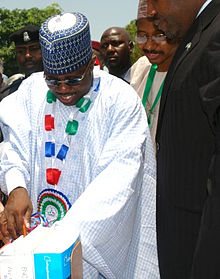Kanouri

Ali Modu Sheriff, a Kanuri politician and governor of Borno State, Nigeria, 2007
|
|
| Total population | |
|---|---|
| (10 million (2013 estimate)) | |
| Regions with significant populations | |
| Nigeria, southeast Niger, western Chad and northern Cameroon. | |
|
|
6,980,000(2013) Does not include Mangari |
|
|
1,100,000 (2013) most of which are Kanembu subgroup |
|
|
850,000 (2013) Includes Mangari, Tumari, Bla Bla |
|
|
56,000 (1982) |
| Languages | |
| Kanuri language | |
| Religion | |
| Islam | |
| Related ethnic groups | |
| Kanembu people, Zaghawa, Hausa, Baggara | |
The Kanuri people (Kanouri, Kanowri, also Yerwa and several subgroup names) are an African ethnic group living largely in the lands of the former Kanem and Bornu Empires in Niger, Nigeria and Cameroon. Those generally termed Kanuri include several subgroups and dialect groups, some of whom feel themselves distinct from the Kanuri. Most trace their origins to ruling lineages of the medieval Kanem-Bornu Empire, its client states or provinces. In contrast to neighboring Toubou or Zaghawa pastoralists, Kanuri groups have traditionally been sedentary, engaging in farming, fishing the Chad Basin, and engaged in trade and salt processing.
Kanuri peoples include several subgroups, and identify by different names in some regions. The Kanuri language was the major language of the Bornu Empire and remains a major language in southeastern Niger, northeastern Nigeria and northern Cameroon, but in Chad it is limited to handfuls of speakers in urban centers.
The largest population of Kanuri reside in the northeast corner of Nigeria, where the ceremonial Emirate of Bornu traces direct descent from the Kanem-Bornu empire, founded sometime before 1000 CE. Some 3 million Kanuri speakers live in Nigeria, not including the some 200,000 speakers of the Manga or Mangari dialect. The Nga people in Bauchi State trace their origins to a Kanuri diaspora.
In southeastern Niger, where they form the majority of the sedentary population, the Kanuri are commonly called Beri Beri (a Hausa name). The 400,000 Kanuri population in Niger includes the Manga or Mangari subgroup, numbering some 100,000 (1997) in the area east of Zinder, who regard themselves as distinct from the Beri Beri.
Around 40,000 (1998) members of the Tumari subgroup, sometimes called Kanembu in Niger, are a distinct Kanuri subgroup living in the N'guigmi area, and are distinct from the Chadian Kanembu people. In the Kaour escarpment oasis of eastern Niger, the Kanuri are further divided into the Bla Bla subgroup, numbering some 20,000 (2003), and are the dominant ethnic group in the salt evaporation and trade industry of Bilma.
...
Wikipedia
